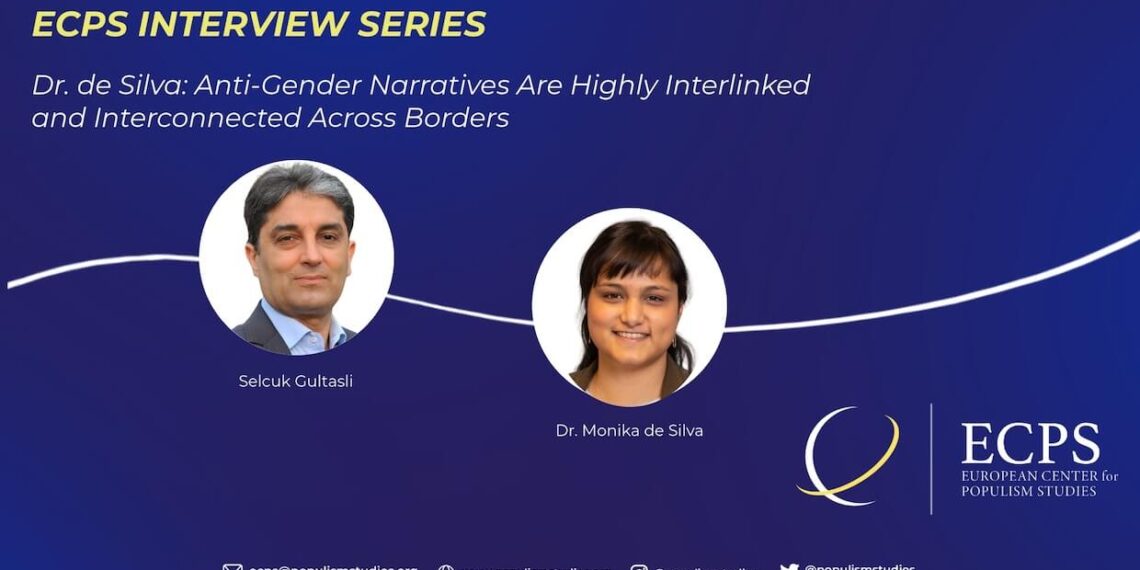“Anti-gender discourses are very interlinked and interconnected; we see these floating narratives repeated across countries like Latvia, Poland, and Russia,” says Dr. Monika de Silva. She explains that populist actors strategically exploit linguistic ambiguity around concepts such as gender, transforming technical legal terms into polarizing political symbols. “Language is never neutral… this linguistic openness is used to argue that because gender replaces the word sex, we can no longer talk about men and women,” she notes. The Istanbul Convention—intended to prevent violence against women—has thus been reframed as an LGBTQ+ threat or “radical feminist project.” Yet Dr. de Silva stresses the importance of civic resistance: Latvia’s mass protests “undoubtedly shaped” the president’s decision to return the withdrawal bill to parliament.
Interview by Selcuk Gultasli
In recent weeks, Latvia has become a focal point in Europe’s ongoing struggle over gender equality, human rights, and democratic resilience. On October 31, 2025, the Saeima (Latvian Parliament) voted 56–32 to withdraw from the Council of Europe’s Istanbul Convention—only a year after ratifying the treaty designed to prevent and combat violence against women. The move relied heavily on claims that the Convention promotes “radical feminism” and “gender ideology,” echoing narratives with well-documented transnational origins. President Edgars Rinkēvičs soon returned the bill to parliament for reconsideration, warning that overturning ratification within a single legislative term would send “a contradictory message… to Latvian society and Latvia’s allies internationally.” He urged postponement until after upcoming elections, noting that Latvia risked becoming the first EU member state to renounce a human-rights treaty.
The backlash triggered the country’s largest civic protests since the 1990s. On November 6, 2025, more than 10,000 demonstrators gathered in Riga under the slogan “Let’s Protect Mother Latvia,” signaling a groundswell of civic resistance. At stake is not only the institutional integrity of gender-equality policy but also the credibility of Latvia’s constitutional and international commitments, especially given that the EU itself acceded to the Convention in 2023, making certain provisions binding regardless of national withdrawal.
It is against this turbulent backdrop that the European Center for the Study of Populism (ECPS) spoke with Dr. Monika de Silva, a political scientist at the University of Gothenburg. Her research, situated at the intersection of international relations and EU studies, examines how contested normative frameworks travel across borders. Her 2025 doctoral dissertation, “‘Gender Wars’ in Europe: Diplomatic Practice under Polarized Conditions,” traces how bilateral diplomacy and Council of the EU negotiations have been reshaped by conflicts over gender equality and LGBTQ+ rights. She is also affiliated with the Gender and Diplomacy project (GenDip) and the Centre for European Research (CERGU).
In the interview, Dr. de Silva argues that anti-gender discourse is best understood as a transnationally circulating narrative rather than merely a domestic reaction: “Anti-gender discourses are very interlinked and interconnected… we see manifestations of that as floating narratives that are very similar, whether we look at Latvia, Poland or Russia, etc.”
She identifies both supply and demand factors driving the spread of “gender ideology” rhetoric across Europe, noting that populist radical right actors strategically translate technical legal language into ideologically charged frames, exploiting linguistic ambiguity: “Language is never neutral… this linguistic openness is definitely used to advance such narratives.”
Dr. de Silva further highlights how withdrawal debates are reframing the Istanbul Convention away from its core purpose—preventing violence against women—toward narratives that depict it as an LGBTQ+ threat or “radical feminist project.” These interpretations, she warns, are not new; similar tropes have circulated across Europe for nearly a decade.
Yet her analysis also highlights agents of democratic resilience. Civil society mobilization, she observes, has already influenced decision-making: “The president… decided to return the law to parliament, and I am sure that seeing the largest protests in Latvia helped shape this decision.”
Finally, she issues a clear warning about governance consequences. Withdrawal would remove Latvia from GREVIO’s monitoring regime, generating critical transparency and implementation gaps: “A state not part of the Convention would not report to GREVIO… whatever it does is therefore less transparent, especially internationally.”
This interview thus offers rich insight into how legal, discursive, and geopolitical forces converge to shape contemporary anti-gender mobilization—and how democratic institutions and civil society may yet respond.


